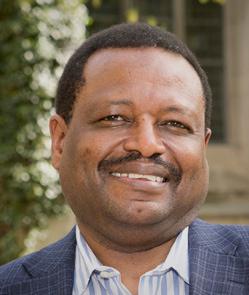
2 minute read
Letter From the Chair
The 2020-21 academic year was one of challenges and opportunities. The challenges presented by the COVID-19 pandemic remained the same as last year — how to sustain an active teaching environment and to maintain our focus on teaching, advising and faculty research while working remotely. As a Department built on active interaction between faculty and students, we missed the sense of community that has made us distinctive; we particularly felt the difficulties of advising and mentoring graduate and undergraduate students in the absence of face to face contact. At the same time, however, the pandemic forced us to be creative in our community building projects, especially at the undergraduate level where we used the digital media to reach out to our students and to develop continuous “...the pandemic activities on line. During the year we were able to hold more events for our students than we have forced us to be done in the past and the faculty was gratified to see students who had not met in person enter into collaborative intellectual and creative projects.
creative in our
community During the course of the year, we were able to use electronic and digital resources to enhance our building projects, traditional strengths in innovative and collaborative teaching. Using the resources provided by the College (through the McGraw Center), the University Library, and an inhouse “best-practices” guide especially at the that the faculty developed at the end of the last academic year, faculty were able to sustain quality undergraduate instruction. Although they missed face to face interactions with their students, most members of level where we the faculty reported that they were extremely pleased with their teaching online. used the digital The major challenge faced by the Department at the beginning of the pandemic was how to meet media to reach out the immense and urgent needs of our graduate students, especially those in the final years of study. to our students I’m pleased to report that for the second year in a row we were able to use our internal resources to provide financial support to enrolled students. A record number of students successfully defended and to develop their dissertations in 2020-21 and despite a difficult job market many of them have found positions continuous at leading universities and institutions. activities on line.” The Department has responded enthusiastically to the University’s call for diversity and access. We have recruited an outstanding group of assistant professors who are bringing unprecedented diversity to our curriculum, offering courses in African American, Asian American, Native American and Latinix Studies. While we continue to maintain our traditional strengths in the historical study of English Literature in a global context, we are also at the forefront of efforts to rethink the humanities at Princeton, providing leadership in Digital Humanities and Environmental Studies.
The central issue the Department faces is how to maintain our position as a Humanities Department and emphasize the unique, ongoing value of the Humanities during a time of intense global crisis. Members of the faculty recognize the need for us to rethink the nature of our field and subfields and to initiate changes that are necessary to respond to a changing profession both at the graduate and undergraduate levels. Not unexpectedly, there are differences of opinion about how to undertake this task, but I remain confident that these differences will be overcome and we will find ways of enhancing our existing strengths and create a space for change and innovation.





